11 Budget Tips For Students Studying Abroad in Europe
11 Budget Tips For Students Studying Abroad in Europe
Staying in hostels, cooking your own meals, and taking overnight buses — these are just some budget tips to help you stretch your dollar while studying abroad in Europe.
Isaac Neo Aug 21st, 2018
Living overseas on a budget can be tough, and even more so if you’re an intrepid traveller who wants to explore. Europe is slightly easier to explore than other continents due to the free movement of residents in the Schengen Area, but all the little costs from travelling, accommodation, and food can slowly add up. Here are some budget tips for students living and studying abroad in Europe to stretch your dollar:
1. Get an ISIC Card to enjoy student discounts!
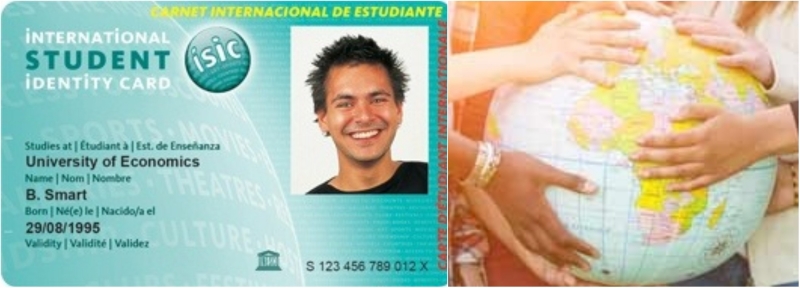
Since 1968, the International Student Identity Card (ISIC) has been helping students all over the world save money by giving discounts on things like accommodation, restaurants, entertainment options, retail purchases, and more! For just $25 a year, you can register for a card that will allow you to enjoy discounts with over 150,000 partners in over 130 countries all over the world.
Whether it’s saving money on meals, enjoying discounted rates for accommodation, or buying cheaper plane tickets, the value of the ISIC card makes it a no-brainer to get if you’re a frequent traveller. You can check what great deals your card entitles you in the country you’re in currently here .
2. Use GoEuro to compare different ways to travel between countries
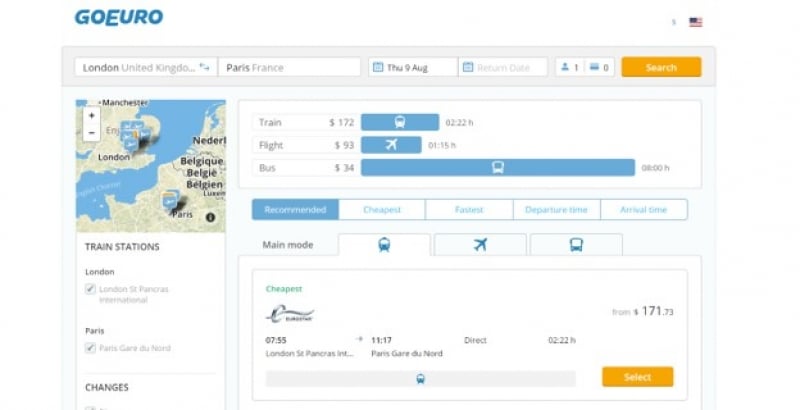
If you’re studying in Europe, there’s no travel portal more convenient to plan your travels around the continent than GoEuro . Simply enter the two cities you want to travel between, the dates you wish to travel, and it will give you all possible train, flight, and bus connections between the two cities and compare the cost, travel time, departure and arrival times of all of them. You can then simply pick the option that suits you best and it will link you to the booking page of the transport provider.
This website is really useful as you might think buses are the most cost-effective way to travel between two countries, but if you book far enough in advance, flights are sometimes quite comparable in terms of price and take a much shorter time. Hence, it is important to compare the various transport options to find which option best suits you, instead of instantly going for the cheapest option. After all, time is money!
3. Travel on non-peak days like Thursdays or Mondays

As a student, you might have the opportunity to plan your own timetable and give yourself an ‘off’ day every week. If you have no lessons on Friday and/or Monday, consider starting your weekend trips on Thursday night and returning on Monday, which is when transport prices tend to be cheaper. You can enjoy a longer weekend getaway for a cheaper price when using this tip!
4. Travel on overnight trains/buses to save on accommodation

If you’re travelling between two cities that are a reasonable distance from each other, opt for sleeper trains or buses, so that you can kill two birds with one stone by catching up on your sleep while travelling at night. This way, you can save money on accommodation and arrive in the morning at your location refreshed and ready for a full day of exploration.
However, if you’re not someone who can sleep easily on buses and trains…
5. Look for cheaper accommodation options when travelling
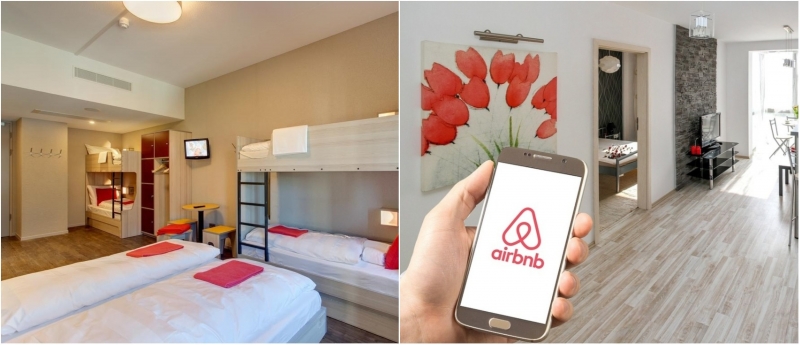
If you’re a solo traveller, hostels will be your best friend. For a low price, you can get a decent bed with no frills, which is fine because you’ll spend most of your time exploring the city anyway. Hostels are also often filled with fellow students, so you can mix around with them and find fellow travel companions. For an even cheaper option, you can go couchsurfing if you’re okay with sleeping in a stranger’s house alone!
If you’re travelling as a couple or with a group of friends, finding an Airbnb might be more preferable. Not only can you get a whole room or apartment to yourselves, you might even find a location in the heart of the city for a reasonable price after you divide the cost amongst yourselves, as well as get the chance to interact with the locals.
6. Seek out the cheaper supermarkets in each city

For buying your daily groceries, or even while you’re on the road, check out discount supermarkets like Aldi and Lidl for great deals. You won’t find any premium products at these stores, but they’ll sell the basic versions of daily necessities like breakfast cereals, freshly-baked bread, fruits and vegetables, pre-packaged meats and cheeses, condiments and spreads, and toiletries.
One tip to take note while on the road is to bring along a loaf of bread and a jar of jam or peanut butter to make sandwiches for your breakfast or a snack if you’re feeling peckish. You’ll be able to save more money for your other meals by doing so. Buying pre-packaged food also saves you the trouble of eating at overpriced eateries at train stations or bus terminals when travelling. You can even pick up discounted bottles of wine for a great night out!
7. Cook your own meals instead of eating out

Of course, all that processed food won’t be healthy for you. You’ll have plenty of time while studying abroad to hone your cooking skills, however! Your meals need not be limited to just making fried rice or pasta; why not buy a cookbook and learn how to cook some healthy homemade meals?
Not only is buying your own ingredients and cooking your own dishes cheaper than eating out, you have full control of what you put inside each dish. While travelling, you can make use of the common kitchens in hostels or if your Airbnb apartment has a kitchen, whip up some quick dishes if you need to tighten your purse strings. Do remember to treat yourself every once in a while though — you’re overseas to try new things!
8. Whenever you use your credit card, pay in the local currency
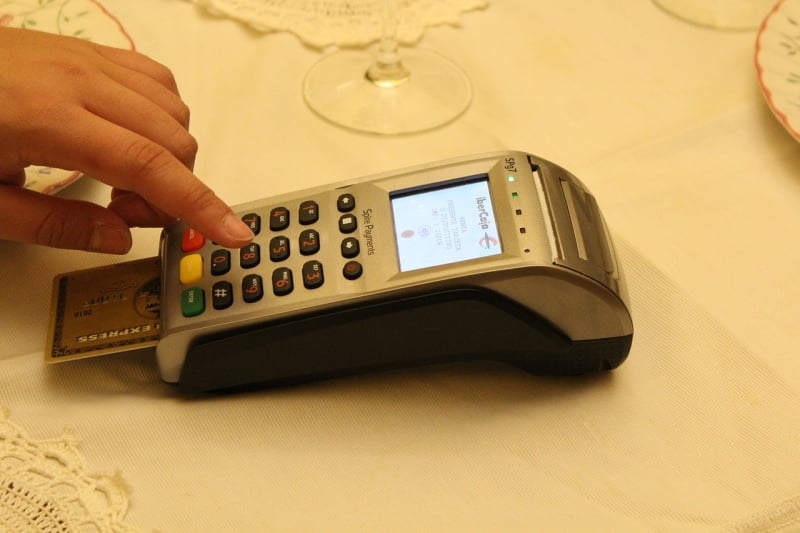
This tip’s a bit technical: pay in the local currency whenever using your credit card in a foreign country. This is because if you choose to pay in your home currency, you will be charged a Dynamic Currency Conversion (DCC) fee by an unaffiliated merchant to convert the local currency amount to your own currency, sometimes at a markup of up to 5%. Although you might feel more secure knowing the final amount in your home currency, it will almost certainly be more expensive.
Hence, if you choose to pay in the local currency, you may not be sure of the exact exchange rate used by your credit card company, but you can always check your credit card statement online after a few days. Furthermore, in both cases, the credit card companies will charge administrative transaction fees on top of your purchase, so you won’t be saving on that. Try to get a card which charges the lowest transaction fees to save more money!
9. Drink from the tap!

Is bottled water taking a chunk out of your budget? Most big cities in Europe have potable tap water, so you can bring around your own water bottle and fill it up before leaving your accommodation in the morning or at public restrooms around the city. Some countries like Italy or Germany even have public taps where you can refill your water on the street.
Do note that this tip only really applies to Western and Central Europe, as the Eastern European countries largely do not have potable tap water yet. When in doubt, buy a bottle of water in the supermarkets — it’s much cheaper than falling ill and having to get treated.
10. Buy or rent a bike to get around town
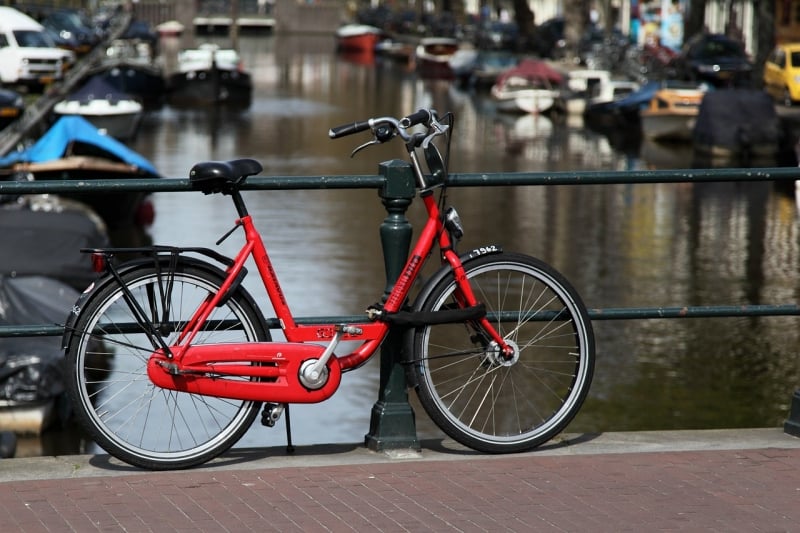
Many European cities are increasingly becoming more bicycle-friendly, with many dedicated bike lanes and car-free streets springing up. If you’re studying abroad for more than six months in cities like Amsterdam, Berlin, or Copenhagen, it might be more cost effective to buy a secondhand bicycle when you first arrive and sell it at a discount when you leave the country, rather than solely relying on public transport to get around the city.
If you’re just visiting a city for a day or two, a quick and effective way to see all the sights would be to rent a bike to explore or to go on a guided bike tour around the city. Not only will you get to get a glimpse of local neighbourhoods as you traverse the streets, you can stop and explore an attraction that you would like to check out anytime you like.
11. Look for free tours and things to do while travelling

Even if you’re on a budget, you can still see most of the sights in each city. For example, London is packed with many free museums like the British Museum and the Natural History Museum, which feature a wide collection of historical artefacts, and free galleries like the Tate Modern or the National Gallery feature well-known classic paintings by artists like Leonardo Da Vinci and Michelangelo. Historical places like St Peter’s Basilica in Vatican City and the Pantheon in Rome are also free to enter.
You can also go on free walking tours in each city, but don’t forget to tip the guide an amount you feel is suitable afterwards, as they need to eat too! When in doubt, ask a local what to do — they’ll know the best places to go in the city.
With these handy tips, you’ll be an expert in budgeting and making the most of your limited funds in no time. Don’t go overboard though, and splurge a little every now and then. After all, studying abroad is a once-in-a-lifetime experience, and you’re entitled to the little luxuries!
11 Budget Tips For Students Studying Abroad in Europe
Staying in hostels, cooking your own meals, and taking overnight buses — these are just some budget tips to help you stretch your dollar while studying abroad in Europe.
Isaac Neo Aug 21st, 2018
Living overseas on a budget can be tough, and even more so if you’re an intrepid traveller who wants to explore. Europe is slightly easier to explore than other continents due to the free movement of residents in the Schengen Area, but all the little costs from travelling, accommodation, and food can slowly add up. Here are some budget tips for students living and studying abroad in Europe to stretch your dollar:
1. Get an ISIC Card to enjoy student discounts!

Since 1968, the International Student Identity Card (ISIC) has been helping students all over the world save money by giving discounts on things like accommodation, restaurants, entertainment options, retail purchases, and more! For just $25 a year, you can register for a card that will allow you to enjoy discounts with over 150,000 partners in over 130 countries all over the world.
Whether it’s saving money on meals, enjoying discounted rates for accommodation, or buying cheaper plane tickets, the value of the ISIC card makes it a no-brainer to get if you’re a frequent traveller. You can check what great deals your card entitles you in the country you’re in currently here .
2. Use GoEuro to compare different ways to travel between countries

If you’re studying in Europe, there’s no travel portal more convenient to plan your travels around the continent than GoEuro . Simply enter the two cities you want to travel between, the dates you wish to travel, and it will give you all possible train, flight, and bus connections between the two cities and compare the cost, travel time, departure and arrival times of all of them. You can then simply pick the option that suits you best and it will link you to the booking page of the transport provider.
This website is really useful as you might think buses are the most cost-effective way to travel between two countries, but if you book far enough in advance, flights are sometimes quite comparable in terms of price and take a much shorter time. Hence, it is important to compare the various transport options to find which option best suits you, instead of instantly going for the cheapest option. After all, time is money!
3. Travel on non-peak days like Thursdays or Mondays

As a student, you might have the opportunity to plan your own timetable and give yourself an ‘off’ day every week. If you have no lessons on Friday and/or Monday, consider starting your weekend trips on Thursday night and returning on Monday, which is when transport prices tend to be cheaper. You can enjoy a longer weekend getaway for a cheaper price when using this tip!
4. Travel on overnight trains/buses to save on accommodation

If you’re travelling between two cities that are a reasonable distance from each other, opt for sleeper trains or buses, so that you can kill two birds with one stone by catching up on your sleep while travelling at night. This way, you can save money on accommodation and arrive in the morning at your location refreshed and ready for a full day of exploration.
However, if you’re not someone who can sleep easily on buses and trains…
5. Look for cheaper accommodation options when travelling

If you’re a solo traveller, hostels will be your best friend. For a low price, you can get a decent bed with no frills, which is fine because you’ll spend most of your time exploring the city anyway. Hostels are also often filled with fellow students, so you can mix around with them and find fellow travel companions. For an even cheaper option, you can go couchsurfing if you’re okay with sleeping in a stranger’s house alone!
If you’re travelling as a couple or with a group of friends, finding an Airbnb might be more preferable. Not only can you get a whole room or apartment to yourselves, you might even find a location in the heart of the city for a reasonable price after you divide the cost amongst yourselves, as well as get the chance to interact with the locals.
6. Seek out the cheaper supermarkets in each city

For buying your daily groceries, or even while you’re on the road, check out discount supermarkets like Aldi and Lidl for great deals. You won’t find any premium products at these stores, but they’ll sell the basic versions of daily necessities like breakfast cereals, freshly-baked bread, fruits and vegetables, pre-packaged meats and cheeses, condiments and spreads, and toiletries.
One tip to take note while on the road is to bring along a loaf of bread and a jar of jam or peanut butter to make sandwiches for your breakfast or a snack if you’re feeling peckish. You’ll be able to save more money for your other meals by doing so. Buying pre-packaged food also saves you the trouble of eating at overpriced eateries at train stations or bus terminals when travelling. You can even pick up discounted bottles of wine for a great night out!
7. Cook your own meals instead of eating out

Of course, all that processed food won’t be healthy for you. You’ll have plenty of time while studying abroad to hone your cooking skills, however! Your meals need not be limited to just making fried rice or pasta; why not buy a cookbook and learn how to cook some healthy homemade meals?
Not only is buying your own ingredients and cooking your own dishes cheaper than eating out, you have full control of what you put inside each dish. While travelling, you can make use of the common kitchens in hostels or if your Airbnb apartment has a kitchen, whip up some quick dishes if you need to tighten your purse strings. Do remember to treat yourself every once in a while though — you’re overseas to try new things!
8. Whenever you use your credit card, pay in the local currency

This tip’s a bit technical: pay in the local currency whenever using your credit card in a foreign country. This is because if you choose to pay in your home currency, you will be charged a Dynamic Currency Conversion (DCC) fee by an unaffiliated merchant to convert the local currency amount to your own currency, sometimes at a markup of up to 5%. Although you might feel more secure knowing the final amount in your home currency, it will almost certainly be more expensive.
Hence, if you choose to pay in the local currency, you may not be sure of the exact exchange rate used by your credit card company, but you can always check your credit card statement online after a few days. Furthermore, in both cases, the credit card companies will charge administrative transaction fees on top of your purchase, so you won’t be saving on that. Try to get a card which charges the lowest transaction fees to save more money!
9. Drink from the tap!

Is bottled water taking a chunk out of your budget? Most big cities in Europe have potable tap water, so you can bring around your own water bottle and fill it up before leaving your accommodation in the morning or at public restrooms around the city. Some countries like Italy or Germany even have public taps where you can refill your water on the street.
Do note that this tip only really applies to Western and Central Europe, as the Eastern European countries largely do not have potable tap water yet. When in doubt, buy a bottle of water in the supermarkets — it’s much cheaper than falling ill and having to get treated.
10. Buy or rent a bike to get around town

Many European cities are increasingly becoming more bicycle-friendly, with many dedicated bike lanes and car-free streets springing up. If you’re studying abroad for more than six months in cities like Amsterdam, Berlin, or Copenhagen, it might be more cost effective to buy a secondhand bicycle when you first arrive and sell it at a discount when you leave the country, rather than solely relying on public transport to get around the city.
If you’re just visiting a city for a day or two, a quick and effective way to see all the sights would be to rent a bike to explore or to go on a guided bike tour around the city. Not only will you get to get a glimpse of local neighbourhoods as you traverse the streets, you can stop and explore an attraction that you would like to check out anytime you like.
11. Look for free tours and things to do while travelling

Even if you’re on a budget, you can still see most of the sights in each city. For example, London is packed with many free museums like the British Museum and the Natural History Museum, which feature a wide collection of historical artefacts, and free galleries like the Tate Modern or the National Gallery feature well-known classic paintings by artists like Leonardo Da Vinci and Michelangelo. Historical places like St Peter’s Basilica in Vatican City and the Pantheon in Rome are also free to enter.
You can also go on free walking tours in each city, but don’t forget to tip the guide an amount you feel is suitable afterwards, as they need to eat too! When in doubt, ask a local what to do — they’ll know the best places to go in the city.
With these handy tips, you’ll be an expert in budgeting and making the most of your limited funds in no time. Don’t go overboard though, and splurge a little every now and then. After all, studying abroad is a once-in-a-lifetime experience, and you’re entitled to the little luxuries!
Money Matters: Budgeting Tips for Student Travel in Europe

When considering studying abroad in Europe, a major convincing factor for students is the opportunity to travel. While travel is very exciting, it can also be financially intimidating for those on a study abroad budget.
However, by using the right tools, resources, and tricks, travel is more feasible and less stressful on a student budget. To help out prospective study abroad students or travelers, I’ve listed a few tricks-of-the-trade that I’ve learned throughout my last three years’ experience when traveling in Europe.
1. Budgeting
Something that students often ask before their semesters abroad is, “How much money should I save for traveling?” Ultimately, there is no finite answer. Saving and spending all depends on the individual, as well as the places that they travel and how they plan to get there.
For example, if you plan to fly to big, more expensive cities like London, Paris, and Copenhagen during your travels, you’ll need to save more than someone who plans to take a bus to more inexpensive destinations like places in Poland, Hungary, or the Czech Republic. Depending on how expensive a city was and how luxuriously I decided to live while there, a weekend trip during my fall semester abroad typically cost, once converted back to USD, between $150 and $400.
- When determining how much to save, ask yourself:
- How many trips do I want to take?
- How much do I want to spend on transportation or accommodation?
- How many times do I want to eat out?
- For the museums I want to visit: do they have an entrance fee?
- What activities or tours do I want to do and will those cost money?
- Do the places I’m visiting have STUDENT DISCOUNTS?
By the way, student Discounts are incredible. ALWAYS BRING YOUR STUDENT ID WITH YOU and ask if there’s a student discount at stores and museums. It may be tedious to ask, but it could save you some cash.
Depending on your answers to these questions and how much you research, it is easier to establish an estimate on how much money you should save.
Then, based on how much you plan to save for travel, add on some extra cash as an emergency fund. Typically, based on the total amount of money I’ve saved for a trip, I set aside 15-20% of the savings for worst-case-scenario emergencies, such as if I miss a train, get pickpocketed, or ruin my favorite pair of walking shoes. If you manage to escape your travels emergency-free, then you return home with a bit of extra cash in your account, which is never a bad thing.
For keeping track of your spending and study abroad budget, make a spreadsheet. Online spreadsheets, like Google Sheets, are awesome because you can access them on your computer, tablet, or smartphone and update them on-the-go. On your spreadsheet, include your overall travel or study abroad budget, your emergency fund, and how many trips you want to take and types of spending you’ll do on each. Set up sum equations on the sheet so that it can automatically update itself on how much you’ve spent and how much you have left. For a visual example, I’ve set up a template budgeting spreadsheet made with Google Sheets below.
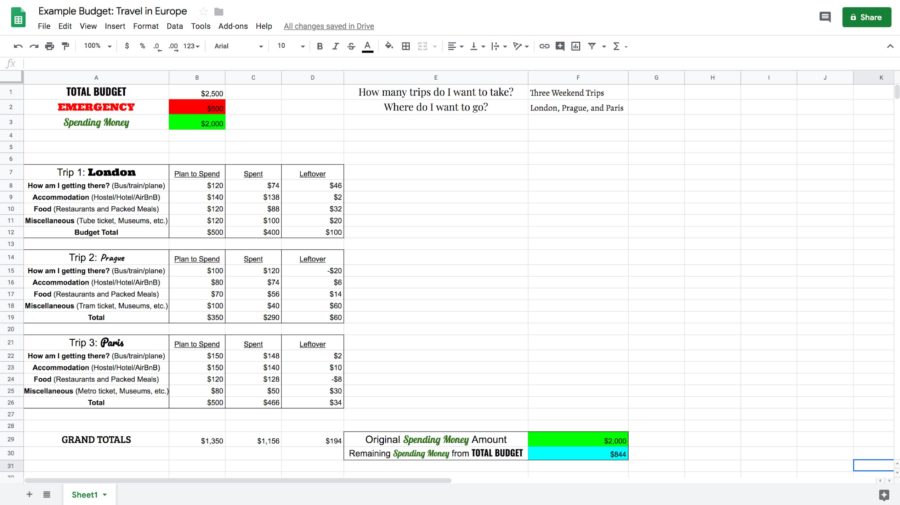
2. Online Resources
In Europe and most parts of the world, the most expensive parts of a trip can be transportation, accommodation, and food. However, with the online resources and tips listed below, budgeting for these costs is much easier and guarantees that – in my opinion – you’re getting the best bang-for-your-buck.
When traveling between cities in Europe, deciding which method of transportation to take can be very time consuming. But with Omio (formerly GoEuro), the task of comparing trains, buses, and airplanes is simple.

All you have to do is enter into the search bar is your departure city, where you are heading, and what dates you’d like to go. The rest is easy. Omio presents which methods of transportation are cheapest and fastest, allowing you to know you’re making the right decision when planning your trip.
HostelWorld.com and Hostels.com
In terms of accommodation, the most frequently used by students on a budget are hostels. In hostels, layouts are often very similar to dorms, with most rooms having shared bedrooms, bathrooms, and communal spaces. When booking a room, you can take your preferences into account by choosing how many roommates, if you want a single-gender or co-ed room, and what type of bathroom access (en-suite v. communal) you’d like to have. Similar to a hotel, the facilities are cleaned daily.
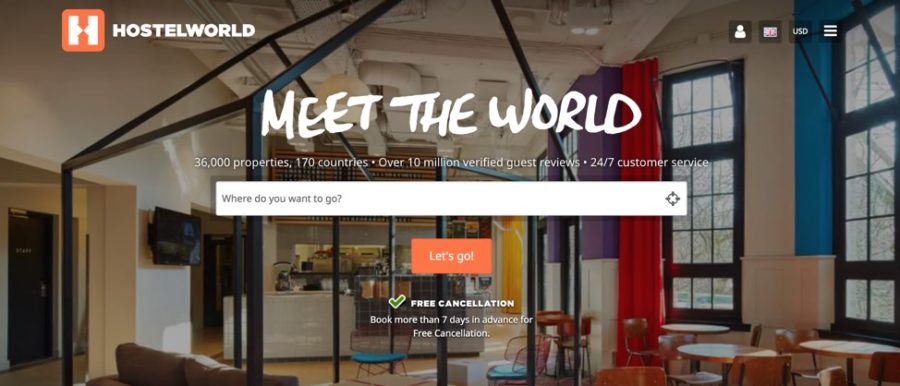
While hostels can be less luxurious than a typical hotels, oftentimes they are the best option for students who are looking to spend less and experience more. Because of the communal aspect, a room in a hostel will be significantly less expensive than a hotel and will serve as a great opportunity to meet new people that you otherwise may not have the chance to interact with.
Also, since hostels know that their main patrons are young people on a budget, their receptionists often have great resources on inexpensive activities in the local area, such as free or discounted city tours and information on local museums or restaurants. Again, hostels are a great way to make new friends from all over the world while not costing you your entire study abroad budget.
If the communal aspects of hostels don’t sound like something that is up-your-alley, other options for accommodations include hotels and Airbnb.
Agoda
A great search tool that I would recommend for finding an inexpensive, traditional hotel room is Agoda. I’ve used it while searching for and booking hotels in Italy, the United Kingdom, and the United States and have never been disappointed with the outcome. However, as most of the hotels listed are known for being budget-friendly, be sure to read reviews before booking.
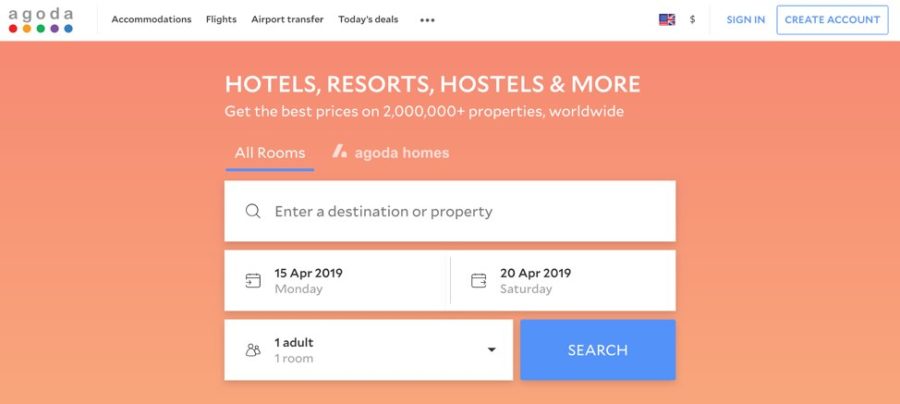
Airbnb
When traveling with a group of friends, looking for an accommodation that will host you all without breaking the bank can be a difficult task. In this situation, I would recommend Airbnb.
By using Airbnb, you can find an accommodation that will sleep everyone and not cost an extraordinary amount. The beauty of traveling in a group means that the cost of accommodation can be divided up between everyone, meaning you can stay somewhere you may have not been able to afford on your own.
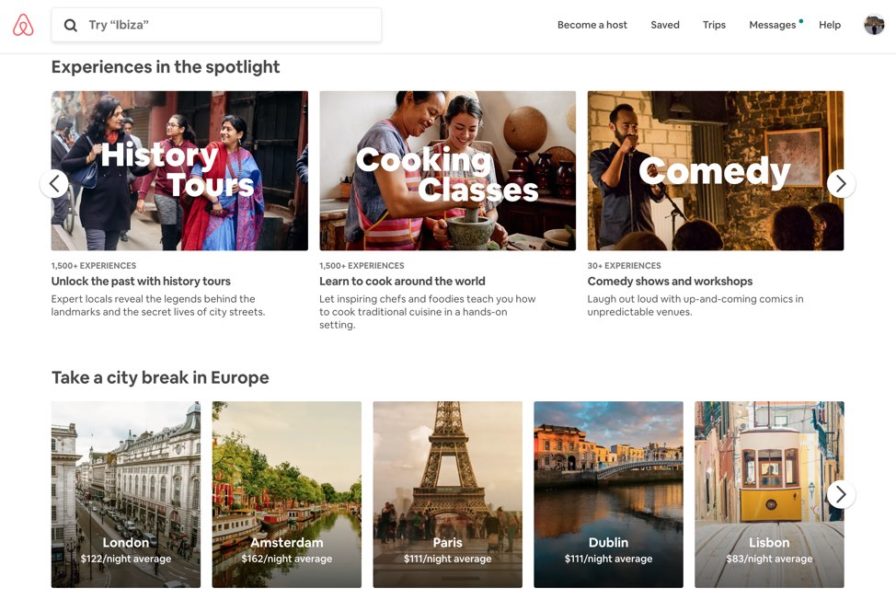
Additionally, Airbnb is a great tool for finding activities to do in the local area. Through their “Experiences” feature, you can search through tours, cooking classes, art classes, and outdoor activities offered by locals to have a truly memorable experience in the city you’re visiting.
Smart Trip and Bus2Alps
If planning, booking, and/or sightseeing without a tour guide seems intimidating, a great resource for traveling students is booking a guided trip. In Europe, two great trip providers are Smart Trip and Bus2Alps as they are budget-friendly and include accommodation, tour guides, activities, and some meals.


Like I said, if planning and traveling without a helping hand seems scary or intimidating, student tour providers can be a great resource for easing you into the groove of traveling while still saving money and meeting new people.
Pro-tip: Take advantage of those AIFS program-led excursions included in your program fees to maximize what you get to see while you’re abroad and to stretch your study abroad budget!
Food Tips
When traveling, a cost that will sneak up on you and pile up is paying for food. However, by budgeting when you plan to eat out and how much you plan to spend, you can stay ahead of this cost and go home with what you expected rather than less.
When planning an itinerary, factor into the schedule when you’d like to eat out or go for a drink. For example, if on a weekend trip, you can plan to eat out for one of each meal: once for breakfast, once for lunch, and once for dinner. Depending on how the food scene in a city is, you can then establish a budget for how much, in total, you plan on eating out. Then, take that amount of cash out of the ATM, hide it in different places on you or in your bag to avoid a potential catastrophe of losing it, and tell yourself: “This is all the money I have to spend on food and drinks.” Whatever cash you have left over, use that to treat yourself, put it back into your savings account, or roll it over to use on your next trip.
When considering hotels, hostels, and Airbnb, a major factor to consider is whether or not they serve breakfast. If so, that instantly eliminates a cost that would’ve added to your overall spending. An even better perk is if the accommodation has a communal kitchen where you can bring in some groceries and cook yourself a meal instead of eating out. Sticking a frozen pizza in the oven is usually cheaper than a meal at a sit-down restaurant.
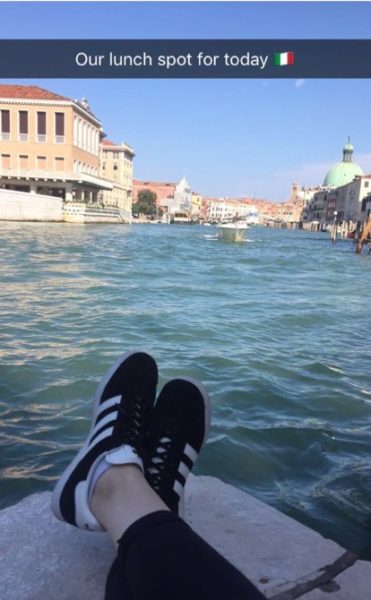
For the meals that you don’t plan on eating at a restaurant, cafe, or your accommodation, my major money saving tip I cannot stress enough is this: PACK YOUR OWN FOOD. Whenever I go on weekend trips, I always bring a shopping bag (if allowed on the transportation service) with a small loaf of bread, a jar or two of some sort of spread (peanut butter, nutella, jam, etc.), a butter knife, some sandwich bags, a pack of wet wipes, a bag of chips, a bag of candy, and a few clementines, apples, or bananas. I also always bring my reusable water bottle.
By bringing this food with me, I always had some food on hand in order to avoid getting hungry and deciding to splurge on whatever restaurant I came across first. On the days that I packed a lunch from the supplies I brought, finding a beautiful spot to sit in a city is easier than finding a restaurant with a view. As long as the area you’re sitting in to eat your home-packed meal doesn’t prohibit food, you’re good as gold to take a break from your day’s activities and just chow down on a nice PB&J and watch the city go by, enjoying the fact that you know you’ve saved yourself some pocket change that can be spent on your next adventure.
This post was contributed by Jane Greis, an AIFS Alumni Ambassador from the Towson University who spent a semester studying abroad with AIFS in Salzburg, Austria.
Source https://www.tripzilla.com/budget-tips-students-europe/82996#:~:text=11%20Budget%20Tips%20For%20Students%20Studying%20Abroad%20in,meals%20instead%20of%20eating%20out%20…%20Meer%20items
Source https://www.tripzilla.com/budget-tips-students-europe/82996
Source https://blog.aifsabroad.com/2019/06/06/tips-student-travel-europe-study-abroad-budget/